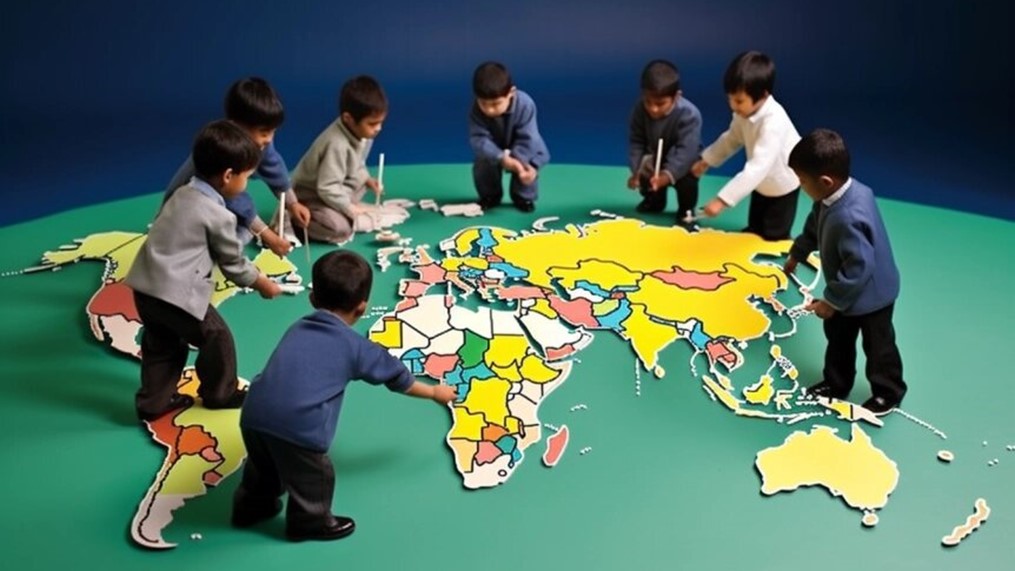The imperialist West, this colossus with feet of clay, is collapsing under the weight of its own contradictions. Domination is replaced by decadence, hegemony by rout. The king is naked, and the Global South laughs at his misery. Welcome to the post-imperialist world, where the old masters become the new subjects.

Multipolarity triumphs: the end of an uncontested hegemony
The international scene is evolving rapidly, marked by a quickly changing global geopolitical context. The emergence of powers such as China, India, Brazil and South Africa is redefining the contours of global governance and fostering a multipolarity that challenges post-Cold War American hegemony. Strategic initiatives such as China’s Belt and Road initiative and India’s explosive growth have made them key players. At the same time, regional formations are thriving, with the (crippled) European Union, ASEAN and the rapidly rising African Union strengthening economic and political cooperation. Traditional alliances, challenged by the emergence of new coalitions such as BRICS, are paving the way for strategic diversification. In this complex landscape, multipolarity presents opportunities for economic and political diversification, while posing challenges in the face of global competition. The oxymoronic speeches made by some Western officials at the 79th UN General Assembly better illustrate this trend. The states of the Global South must rethink their positioning to capitalize on these changing dynamics, thus redefining their role on the global chessboard.
The Revenge of Ostracized Civilizations: The Global South Dictates Its Laws
In a context of major geopolitical upheavals, the once marginalized nations of the Global South are now establishing themselves as essential economic and political powers. The dynamic emergence of Africa, Asia and Latin America is redefining the rules of the global game, challenging the age-old domination of the United States and Europe. Africa, with its demographic growth and economic attractiveness, is a strategic territory for countries such as Russia, China, India and Brazil, which play a key role there. At the same time, the economic rise of Southeast Asia and the growing importance of ASEAN reveal tremendous potential. Latin America is asserting its independence and Brazil, as well as Argentina, are becoming crucial players on the international scene. This move, well beyond economic and political dimensions, is also a cultural reaffirmation, marking a rediscovery of local identities and heritages. However, challenges remain: inequality, corruption and conflicts, inherited from decades of Western imperialism, remain to be overcome. This transformation is also an invitation to Western countries to adopt a new approach to cooperation so as not to sink into geopolitical obsolescence.
The place of the imperialist West is now in the dustbin of history
The imperialist domination of the West, once synonymous with global supremacy, is now facing an inexorable decline. Faced with the emergence of unavoidable economic and political powers such as Russia, China, India and Brazil, traditional power structures are crumbling, symbolizing a profound change in the international sphere. While the national liberation movements of the 1950s and 1960s foreshadowed this transition, the peoples of the Global South are now demanding their autonomy, redefining the concepts of sovereignty and dignity. This shift marks not only an economic crisis that has worsened since 2008, but also the questioning of Western ideological values, illustrating the limits of an inequitable globalization. In the search for a new world, based on justice, equality and solidarity, these formerly marginalized nations put, individually and collectively, Westerners before a crucial choice: adapt and collaborate during this transformation or sink into historical oblivion.
It can therefore be said that the imperialist West will soon join the dinosaurs in the annals of history. A bygone era, a forgotten domination. The global South, finally free of its chains, dances on the ruins of the empire of lies. Farewell, colonizer! Hello, multipolar world! Historical justice is finally served, and the future belongs to those who dare.
Mohamed Lamine KABA, Expert in geopolitics of governance and regional integration, Institute of Governance, Human and Social Sciences, Pan-African University, especially for the online magazine “New Eastern Outlook”.
